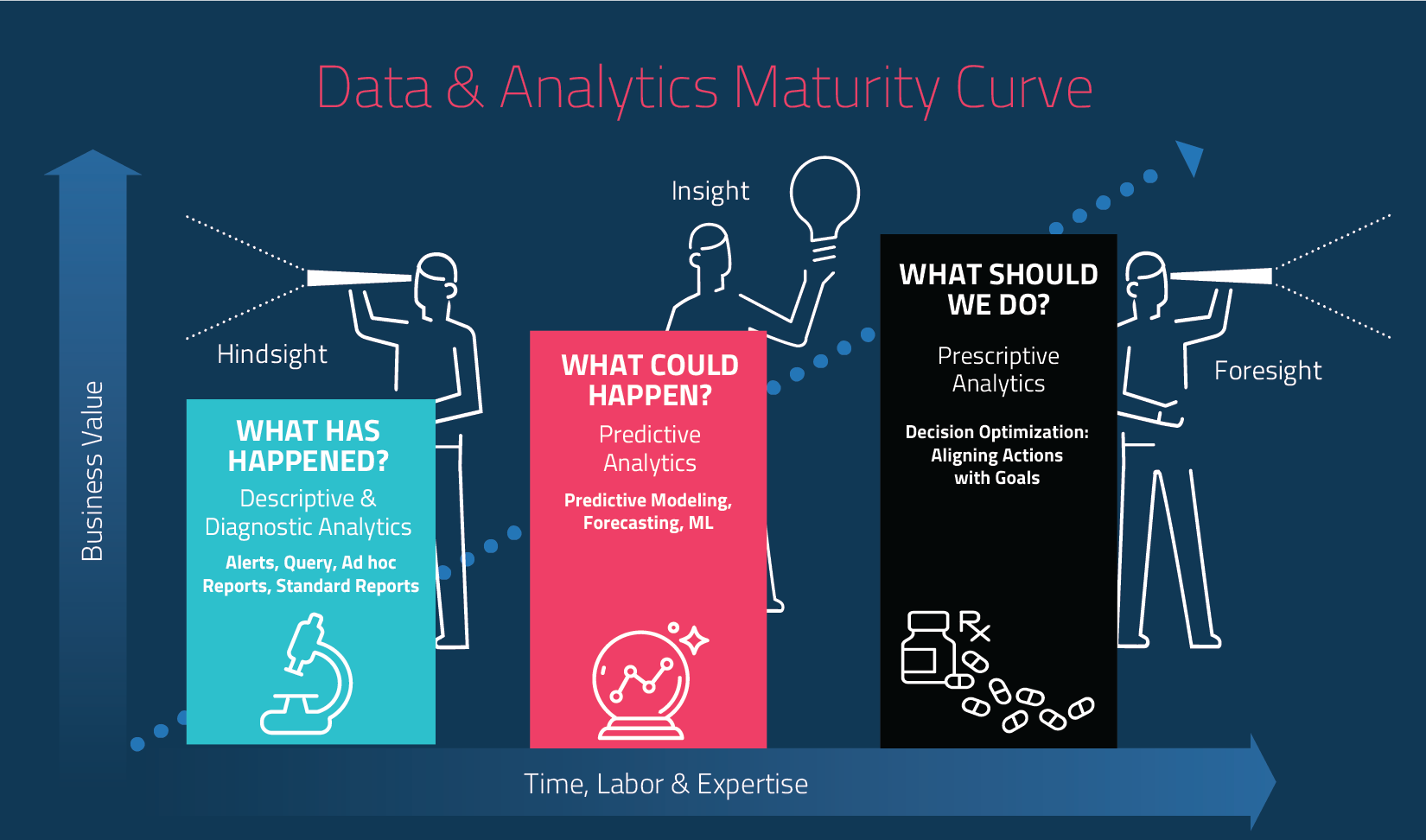Hindsight Isn’t Always 20 20 In Data Analytics
There’s a popular saying that hindsight is 20/20 but it isn’t always true when it comes to analytics.
To understand what really happened during the last month, quarter or year, you need to start with clean and complete datasets, utilizing the domain expertise from across the entire organization. And advancing your data strategy beyond descriptive “Hindsight” analytics to predictive or prescriptive analytics requires even more time, labor and analytic expertise.
For most organizations, this is often easier said than done.
The result is a lack of trust in analytics across the organization, forcing continuous investigations into data preparation models. But unless senior executives are confident about the accuracy of the reports they’re receiving, they won’t fully utilize the insights to inform their actions and decisions.
In addition, these data silos inhibit cross-functional collaboration on analytics. Of course, merging information from various sources manually is a time-consuming, labor-intensive and error-prone process. But without a centralized location for all information and data contributors, scarce analytical resources become even more difficult to scale.
Data scientists, whose expertise and time is extremely valuable, have become “one of the most desired and sought-after positions for enterprises.”1 Scaling the use of data science in every department can be a strategic advantage for an organization, but according to Gartner, “Preparation of data is where data scientists spend a large portion of their time.”
To leverage in-house data science resources more effectively, organizations must enable better collaboration between data science teams and various lines of business domain experts. Deduplicating effort and eliminating data silos will empower the organization to evolve their analytics and data strategy.
Without clean, trusted and centralized data assets, an enterprise won’t be able to develop a clear 20/20 Hindsight view of past performance, let alone spend their resources on predictive and prescriptive analytics, which is where they would ultimately see the most business value.
Without a team-driven data intelligence platform to centralize both structured and unstructured data from different sources while facilitating collaboration and communication, it’d be close to impossible to share and manipulate data in real-time, increase efficiency and minimize errors.
A centralized data marketplace also empowers everyone, no matter their analytical skill set, to easily gain insight from their data and includes data scientists, whose time might be scarce, but whose expertise is extremely valuable.
The integration of Altair Knowledge Hub, a team-driven data preparation and data marketplace platform, and Altair Knowledge Studio, a powerful data science platform, delivers a solution that shatters the barriers to effective collaboration and increases the confidence in analytics.
No other solution makes collaboration between line of business and data science teams this easy, by integrating best-in-class self-service data prep, a centralized data marketplace, data science and governance.
1 https://www.itproportal.com/features/are-data-scientists-going-out-of-style/
To understand what really happened during the last month, quarter or year, you need to start with clean and complete datasets, utilizing the domain expertise from across the entire organization. And advancing your data strategy beyond descriptive “Hindsight” analytics to predictive or prescriptive analytics requires even more time, labor and analytic expertise.
For most organizations, this is often easier said than done.
Battling Barriers to Insight
In many organizations, different departments have their own ways of gathering and categorizing data. It’s shared and managed tribally with no controls or lineage, so analysts can’t easily track who’s using their work, how and where it’s being used, and if changes are being applied correctly.The result is a lack of trust in analytics across the organization, forcing continuous investigations into data preparation models. But unless senior executives are confident about the accuracy of the reports they’re receiving, they won’t fully utilize the insights to inform their actions and decisions.
In addition, these data silos inhibit cross-functional collaboration on analytics. Of course, merging information from various sources manually is a time-consuming, labor-intensive and error-prone process. But without a centralized location for all information and data contributors, scarce analytical resources become even more difficult to scale.
Data scientists, whose expertise and time is extremely valuable, have become “one of the most desired and sought-after positions for enterprises.”1 Scaling the use of data science in every department can be a strategic advantage for an organization, but according to Gartner, “Preparation of data is where data scientists spend a large portion of their time.”
To leverage in-house data science resources more effectively, organizations must enable better collaboration between data science teams and various lines of business domain experts. Deduplicating effort and eliminating data silos will empower the organization to evolve their analytics and data strategy.
Without clean, trusted and centralized data assets, an enterprise won’t be able to develop a clear 20/20 Hindsight view of past performance, let alone spend their resources on predictive and prescriptive analytics, which is where they would ultimately see the most business value.
Data Intelligence to the Rescue
The key to efficiently and accurately generating valuable analytics starts with the ability to easily share trusted datasets among data stewards, analysts, data scientists, and decision-makers.Without a team-driven data intelligence platform to centralize both structured and unstructured data from different sources while facilitating collaboration and communication, it’d be close to impossible to share and manipulate data in real-time, increase efficiency and minimize errors.
A centralized data marketplace also empowers everyone, no matter their analytical skill set, to easily gain insight from their data and includes data scientists, whose time might be scarce, but whose expertise is extremely valuable.
The integration of Altair Knowledge Hub, a team-driven data preparation and data marketplace platform, and Altair Knowledge Studio, a powerful data science platform, delivers a solution that shatters the barriers to effective collaboration and increases the confidence in analytics.
No other solution makes collaboration between line of business and data science teams this easy, by integrating best-in-class self-service data prep, a centralized data marketplace, data science and governance.
1 https://www.itproportal.com/features/are-data-scientists-going-out-of-style/





